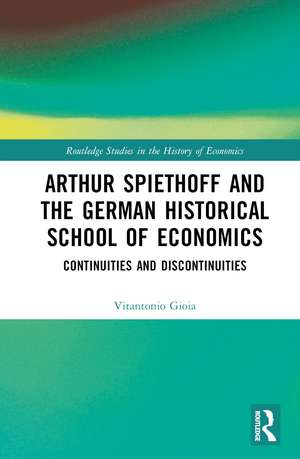Arthur Spiethoff and the German Historical School of Economics: Continuities and Discontinuities: Routledge Studies in the History of Economics
Autor Vitantonio Gioiaen Limba Engleză Hardback – 2 apr 2024
Din seria Routledge Studies in the History of Economics
-
 Preț: 370.72 lei
Preț: 370.72 lei -
 Preț: 302.54 lei
Preț: 302.54 lei - 8%
 Preț: 392.82 lei
Preț: 392.82 lei -
 Preț: 311.28 lei
Preț: 311.28 lei - 9%
 Preț: 1003.10 lei
Preț: 1003.10 lei -
 Preț: 665.68 lei
Preț: 665.68 lei - 9%
 Preț: 935.39 lei
Preț: 935.39 lei -
 Preț: 384.63 lei
Preț: 384.63 lei -
 Preț: 280.74 lei
Preț: 280.74 lei -
 Preț: 326.99 lei
Preț: 326.99 lei -
 Preț: 311.91 lei
Preț: 311.91 lei -
 Preț: 214.15 lei
Preț: 214.15 lei -
 Preț: 310.43 lei
Preț: 310.43 lei -
 Preț: 326.82 lei
Preț: 326.82 lei -
 Preț: 308.97 lei
Preț: 308.97 lei -
 Preț: 324.46 lei
Preț: 324.46 lei -
 Preț: 388.22 lei
Preț: 388.22 lei -
 Preț: 392.71 lei
Preț: 392.71 lei - 26%
 Preț: 850.91 lei
Preț: 850.91 lei - 27%
 Preț: 995.39 lei
Preț: 995.39 lei - 18%
 Preț: 1005.01 lei
Preț: 1005.01 lei - 18%
 Preț: 1002.60 lei
Preț: 1002.60 lei - 26%
 Preț: 1046.46 lei
Preț: 1046.46 lei - 18%
 Preț: 1280.31 lei
Preț: 1280.31 lei - 18%
 Preț: 1055.51 lei
Preț: 1055.51 lei - 18%
 Preț: 1055.51 lei
Preț: 1055.51 lei - 26%
 Preț: 987.72 lei
Preț: 987.72 lei - 25%
 Preț: 824.17 lei
Preț: 824.17 lei - 18%
 Preț: 1061.93 lei
Preț: 1061.93 lei - 18%
 Preț: 716.32 lei
Preț: 716.32 lei - 18%
 Preț: 1006.07 lei
Preț: 1006.07 lei - 18%
 Preț: 1069.92 lei
Preț: 1069.92 lei - 12%
 Preț: 342.67 lei
Preț: 342.67 lei - 26%
 Preț: 991.34 lei
Preț: 991.34 lei - 18%
 Preț: 1056.00 lei
Preț: 1056.00 lei - 18%
 Preț: 1076.53 lei
Preț: 1076.53 lei - 18%
 Preț: 698.08 lei
Preț: 698.08 lei - 22%
 Preț: 332.02 lei
Preț: 332.02 lei - 18%
 Preț: 1169.78 lei
Preț: 1169.78 lei - 18%
 Preț: 1059.84 lei
Preț: 1059.84 lei - 30%
 Preț: 852.88 lei
Preț: 852.88 lei - 25%
 Preț: 830.10 lei
Preț: 830.10 lei - 18%
 Preț: 1125.78 lei
Preț: 1125.78 lei - 18%
 Preț: 1062.98 lei
Preț: 1062.98 lei - 18%
 Preț: 847.96 lei
Preț: 847.96 lei - 18%
 Preț: 953.01 lei
Preț: 953.01 lei - 18%
 Preț: 1168.76 lei
Preț: 1168.76 lei
Preț: 1004.68 lei
Preț vechi: 1225.22 lei
-18% Nou
Puncte Express: 1507
Preț estimativ în valută:
192.25€ • 201.13$ • 159.70£
192.25€ • 201.13$ • 159.70£
Carte tipărită la comandă
Livrare economică 03-17 aprilie
Preluare comenzi: 021 569.72.76
Specificații
ISBN-13: 9781032148755
ISBN-10: 1032148756
Pagini: 228
Dimensiuni: 156 x 234 x 14 mm
Greutate: 0.58 kg
Ediția:1
Editura: Taylor & Francis
Colecția Routledge
Seria Routledge Studies in the History of Economics
Locul publicării:Oxford, United Kingdom
ISBN-10: 1032148756
Pagini: 228
Dimensiuni: 156 x 234 x 14 mm
Greutate: 0.58 kg
Ediția:1
Editura: Taylor & Francis
Colecția Routledge
Seria Routledge Studies in the History of Economics
Locul publicării:Oxford, United Kingdom
Public țintă
PostgraduateCuprins
Introduction to the volume 1. Schmoller and the historical approach: research programme and unsolved problems of a “classic” of economics. 2. Schmoller: from naturalism to historical specificity in the analysis of socio-economic systems 3. A Century of German Debates on Crises: 1821 – 1925 4. Epistemological vision and analysis of the cycle: pure economics, ideal-typical models and historical-concrete explanations. 5. Explanations and causality in cycle theory. 6. Conclusions: the German Historical School of Economics and the search for a new paradigm.
Notă biografică
Vitantonio Gioia - Professor Emeritus at the University of Salento. Former professor of the History of Economic Thought at the University of Macerata and at the University of Salento (Italy). At the University of Macerata, he was Dean of the Faculty of Political Science, Coordinator of the International PhD “The European Tradition of Political Economy” and President of the “University Scientific Commission”. At the University of Salento, he was Director of the Department of “History, Society and Human Studies”. His research interests include Economic Methodology and History of Economic Thought. The recurrent topics of his contributions are the authors of the German Historical School (Hildebrand, Roscher, Schmoller, Spiethoff, Sombart, Max Weber), European Utopian Thought (Saint-Simon, Proudhon, Owen), Marx and Marxist thought, evolution of Italian Economics. He has published numerous articles in refereed journals, many books and chapters in books. He has been involved in several European projects, and presented papers to many European Universities or international conferences.
Descriere
Arthur Spiethoff, an economist of the German Historical School of Economics, is best known for his theory of the business cycle. Despite him calling for unified reading of his work, his epistemological thinking has received less attention. This book addresses that gap by analysing his theory of the business cycle in the light of those views.
